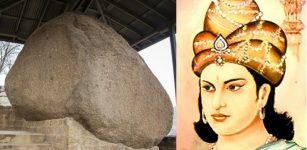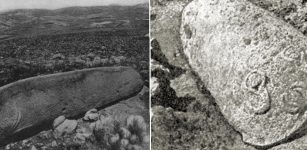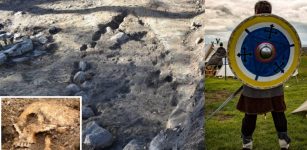Why Was Alexander A Great Military Genius?
AncientPages.com - Alexander the Great (Alexander III of Macedon), was a military genius who changed the nature of the ancient world and he did it in little more than a decade.
Alexander was born in Pella, the ancient capital of Macedonia in July 356 BC. His parents were Philip II of Macedon and his wife Olympias.
After his father's death Alexander inherited a powerful yet very unstable kingdom but he quickly harnessed the Macedonian forces that his father’s reforms had made into the premier military power in the region. In 334 B.C., he led a grand army across the Hellespont in Asia.
With some 43,000 infantry and 5,500 cavalry, it was the most formidable military expedition ever to leave Greece.
He then led his powerful army to victories across the Persian territories of Asia Minor, Syria and Egypt and during this time, he suffered not a single defeat.
In his book "History's Greatest Military Commanders", Barry Linton writes:
"Alexander of Macedon conquered and expanded an Empire extending from Greece to faraway Indian Asia in a life cut short at the age of only 32..."
"In the key battle of Chaeronea – a decisive encounter in Phillip's campaign to defeat the Greeks and add their lands to the Macedonian Empire – the 18-year-old Alexander was given the responsibility of commanding the left wing in the line of battle. Even at this age, his military genius shone through and he was the first to break through the enemy's lines. He fought bravely and was seen as a great credit to his father.."
Alexander the Great was a leader with inspirations for his people.
"Roman historian Plutarch describes an event during the forced desert march where some of his soldiers brought Alexander their meager water supply in an upturned helmet. Alexander without hesitation refused to drink, boldly declaring that he would suffer thirst alongside his men. The surrounding soldiers were moved and responded that they would “follow such a King anywhere...”
See also:
How Did Alexander The Great Die?
Gordian Knot And How Alexander The Great Managed To Outmaneuver The Problem
His greatest victory was at the Battle of Gaugamela, in what is now northern Iraq, in 331 BC. The young king of Macedonia, leader of the Greeks, overlord of Asia Minor and pharaoh of Egypt became 'great king' of Persia at the age of 25.
Over the next eight years, in his capacity as king, commander, politician, scholar and explorer, Alexander led his army a further 11,000 miles, founding over 70 cities and creating an empire that stretched across three continents and covered around two million square miles.
The entire area from Greece in the west, north to the Danube, south into Egypt and as far to the east as the Indian Punjab, was linked together in a vast international network of trade and commerce.
This was united by a common Greek language and culture.
The fact that his army only refused to follow him once in 13 years of a reign during which there was constant fighting, indicates the loyalty he inspired.
Copyright © AncientPages.com All rights reserved. This material may not be published, broadcast, rewritten or redistributed in whole or part without the express written permission of AncientPages.com
Expand for referencesReferences:
Freeman Ph. Alexander the Great
Thomas R. Martin, Christopher W. Blackwell, Alexander the Great: The Story of an Ancient Life
More From Ancient Pages
-
 The Ruins Of Pennard Castle And The Tale Of Faeries’ Curse
Featured Stories | Mar 2, 2016
The Ruins Of Pennard Castle And The Tale Of Faeries’ Curse
Featured Stories | Mar 2, 2016 -
 Ancient Petroglyphs In Toro Muerto Are Not What We Thought – Archaeologists Say
Archaeology | May 24, 2024
Ancient Petroglyphs In Toro Muerto Are Not What We Thought – Archaeologists Say
Archaeology | May 24, 2024 -
 Valkyries Sigrdriva And Brynhildr: Brave Warriors Who Were Punished By God Odin In Norse And Germanic Mythology
Featured Stories | Apr 4, 2017
Valkyries Sigrdriva And Brynhildr: Brave Warriors Who Were Punished By God Odin In Norse And Germanic Mythology
Featured Stories | Apr 4, 2017 -
 On This Day In History: Fascinating Prague Astronomical Clock Mentioned For The First Time – On Oct 9, 1410
News | Oct 9, 2016
On This Day In History: Fascinating Prague Astronomical Clock Mentioned For The First Time – On Oct 9, 1410
News | Oct 9, 2016 -
 Astronomically Aligned Temples And Pyramids Of Ancient World
Featured Stories | Dec 10, 2021
Astronomically Aligned Temples And Pyramids Of Ancient World
Featured Stories | Dec 10, 2021 -
 Race Against Time: Crucial Expedition To Delve Into Bouldnor Cliff, Europe’s Mesolithic Underwater Stone Age Site
Underwater Discoveries | Apr 28, 2024
Race Against Time: Crucial Expedition To Delve Into Bouldnor Cliff, Europe’s Mesolithic Underwater Stone Age Site
Underwater Discoveries | Apr 28, 2024 -
 People With Neanderthals’ Pain-Related Gene May Suffer More On A Daily Basis
DNA | Jul 27, 2020
People With Neanderthals’ Pain-Related Gene May Suffer More On A Daily Basis
DNA | Jul 27, 2020 -
 On This Day In History: Riot Over Wine In Oxford – On Feb 10, 1355
News | Feb 10, 2017
On This Day In History: Riot Over Wine In Oxford – On Feb 10, 1355
News | Feb 10, 2017 -
 On This Day In History: Parachute Jump From 1,000 m Above Paris Is Recorded – On Oct 22, 1797
News | Oct 22, 2016
On This Day In History: Parachute Jump From 1,000 m Above Paris Is Recorded – On Oct 22, 1797
News | Oct 22, 2016 -
 A 4,500-Year-Old Collective Tomb In France Reveals Its Secret – The Final Stage In The Formation Of The ‘European Genome’
Featured Stories | Jul 5, 2024
A 4,500-Year-Old Collective Tomb In France Reveals Its Secret – The Final Stage In The Formation Of The ‘European Genome’
Featured Stories | Jul 5, 2024 -
 Clay Tablets Reveal Sumerian Doctors Treated Disease With Spells Of Magic And Medicine
Archaeology | Feb 13, 2018
Clay Tablets Reveal Sumerian Doctors Treated Disease With Spells Of Magic And Medicine
Archaeology | Feb 13, 2018 -
 Ancient DNA Reconstructs Rise Of Largest Empires In History Of Inner Asia
Archaeology | Nov 6, 2020
Ancient DNA Reconstructs Rise Of Largest Empires In History Of Inner Asia
Archaeology | Nov 6, 2020 -
 Mansehra Rock Edicts – Last Words Of Emperor Ashoka
Featured Stories | May 27, 2019
Mansehra Rock Edicts – Last Words Of Emperor Ashoka
Featured Stories | May 27, 2019 -
 Early, Complex Brain Surgery Performed In Ancient Greece
Archaeology | Apr 8, 2020
Early, Complex Brain Surgery Performed In Ancient Greece
Archaeology | Apr 8, 2020 -
 Mysterious 2000-Year-Old Carved Vishap Stone Monuments Of Armenia
Featured Stories | Dec 13, 2016
Mysterious 2000-Year-Old Carved Vishap Stone Monuments Of Armenia
Featured Stories | Dec 13, 2016 -
 2,000 Years Ago Mysterious Foreigner With Unique Ancestry Traveled To Cambridgeshire – Who Was He?
Archaeology | Dec 27, 2023
2,000 Years Ago Mysterious Foreigner With Unique Ancestry Traveled To Cambridgeshire – Who Was He?
Archaeology | Dec 27, 2023 -
 Rare Viking Ship Burial At Gamla Uppsala Reveals Its Secrets – What’s Inside?
Archaeology | Aug 8, 2020
Rare Viking Ship Burial At Gamla Uppsala Reveals Its Secrets – What’s Inside?
Archaeology | Aug 8, 2020 -
 Controversial “Life Of St. Issa” Scroll Reveals Jesus Spent Several Years In India And Tibet
Artifacts | Nov 4, 2014
Controversial “Life Of St. Issa” Scroll Reveals Jesus Spent Several Years In India And Tibet
Artifacts | Nov 4, 2014 -
 Curious Ancient Prairie Mystery In Washington Scientists Cannot Solve – Maybe You Have An Idea What Happened?
Featured Stories | Nov 10, 2024
Curious Ancient Prairie Mystery In Washington Scientists Cannot Solve – Maybe You Have An Idea What Happened?
Featured Stories | Nov 10, 2024 -
 Roman Shipwreck Carrying Enormous, Rare Cargo Of 1,800-Year-Old Marble Artifacts Found
Archaeology | May 19, 2023
Roman Shipwreck Carrying Enormous, Rare Cargo Of 1,800-Year-Old Marble Artifacts Found
Archaeology | May 19, 2023


